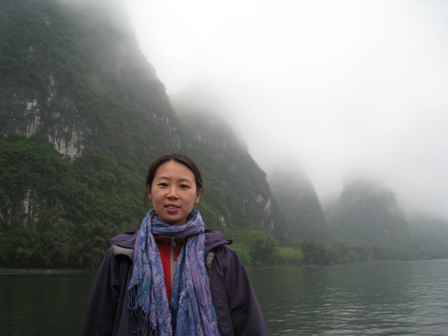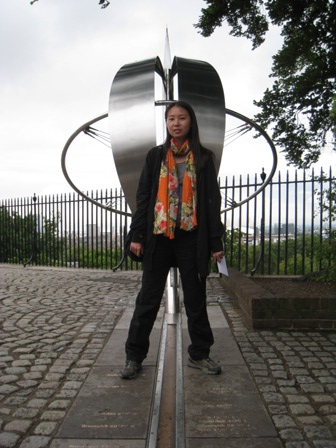| Bringing China to the World! Chung Wah Chow Lonely Planet Travel Writer |

|

|

|
| Lifestyle | |
| Sunday, 03 October 2010 | |
|
China is now one of the world’s hottest tourist destinations with tourists flocking to sample the rich heritage and diversity of this ever-evolving nation. Travel writer, Chung Wah Chow, is one of the lucky few who makes a living from doing what, many would deem, a dream job! Here, she takes time out of her busy schedule of travelling to exotic places to give us the low down on the best places to explore in China and what life is really like as a travel writer!
Dimsum: So how did you become a professional travel writer? Surely, it must be one of the best jobs in the world!
Firstly, I enjoy traveling very much and I also love writing! I started writing travelogues after I completed my Silk Road journey eight years ago. I then, was approached by a guidebook publisher to write travel guides after they saw the samples of my travelogues.
Dimsum: Is travel writing as straight forward as it seems? Do you have any interesting stories to share with our readers?
People tend to romanticise the job as a travel writer. Well, travel writing is fun, but on the other hand you need to have a good sense of time management. There are deadlines to finish research and write-ups. Also, you need to go to places people normally won't go or linger (e.g. bus stations, checking hotel rooms). These are the boring parts! But of course, it's also full of fun! Interacting with different people always bring me surprises. I recall when I was travelling in Kashgar in western China, originally I was going to a ruin that was 30km outside of the city. The Uighur taxi driver took a detour to his home on our way back, which was in a very traditional Uighur adobe house, and he invited all of us to his home for tea. We had a wonderful afternoon there, not only because of the free tea, but that time allowed us a glimpse of Uighur village life.
Dimsum: If a person from the UK was to travel to China for the first time, where would you suggest they go first and why? China is so vast and diverse, so which cities and provinces do you recommend?
Start with either Hong Kong or Beijing. In Hong Kong, things are relatively easy to manage. People speak English and there is a variety options of cuisines and accommodation. Of course, you can sample Dimsum and the world renowned Cantonese cuisine at its best here.
The reason to start in Beijing is obvious! It's the capital city of China and it has many heritage sites (e.g. Great Wall, Forbidden City) that you have seen in books or TV before you arrived. It is a good introduction to the historic Middle Kingdom. Other provinces for first timers include Suzhou and Hangzhou along the coast, where you can see those traditional water villages with canals running over the city; Xian’s terracotta warriors are also a must.
Dimsum: Do you have any travel tips for a person who wants to travel across China? How can a person avoid any cross cultural misunderstandings?
Bring a Mandarin phrasebook and learning a few useful phrases in Mandarin helps a lot! The locals always treasure foreigners trying their best to communicate in the local language.
Dimsum: As you travel across the vastness of China, are you struck by all the changes to places, peoples and communities brought on by China's relentless drive to become an economic powerhouse?
Sometimes, yes! I somehow wish China can slow down a little bit. A balance of yin and yang is what China really needs to do now.
Dimsum: Large cities such as Beijing are struggling to preserve their old style Hu-Tong Courtyard houses; do you think there is a good balance between preservation of heritage and modernisation in China?
Depends! In Shanghai, most of the historical mansions along the ‘Bund’ are preserved, which I really appreciate. But it's true that a lot of heritage is vanishing in lightening speed. China still has a long way to go to strike a balance between preservation and development.
Dimsum: What are the best ways to travel around China in a cheap and cost effective way?
By train and by domestic flights. the second class compartment (hard sleeper) in a train is good for long-distance travel; fast and affordable! If you are in a hurry, all major cities are well-connected with domestic flights. You can easily get 40% discount even by booking a couple of days in advance.
Dimsum: How well are certain historical sights and places of natural beauty preserved? Is there a collective effort to maintain places of natural beauty in China?
In some parts of China, the local authorities have endeavored to help preserve nature. E.g. Yunnan. Biodiversity is what they treasure. This is indeed a collective effort from the NGOs and the local authorities there. But for most parts of China, well, we still have to wait and see....
Dimsum: You must have sampled a diverse array of cuisines in China! Which is your favourite?
My favourite is still the Cantonese cuisine, but I love Uighur food as well. Shanghai and Beijing cuisines are also my favourite.
Dimsum: With the Shanghai Expo 2010 currently on-going and the recent Beijing Olympics allowing more people to visit China, do you think the world's perceptions of China and its people are changing?
Obviously, there are more foreigners learning and speaking Mandarin than 10 years ago. This is an indication that their perceptions of China are changing.
Dimsum: Have you been to many places in the United Kingdom? Are you a big fan of British culture? What is your favourite destination in the UK?
I have only been to London, Oxford and the Lake District. I was a frequent visitor to London and I really LOVE this city. You'll never get bored there! Bookshop-hopping and visiting the Magnificent Seven cemeteries are the things I love to do in London every time I visited.
Thank you!
Chung Wah Chow has co-written Lonely Planet guidebooks for Hong Kong, China and Macau.
Chung Wah Chow Biography - http://www.lonelyplanet.com/members/cwchow
|
|









